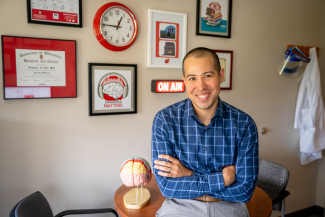
In the world of podcasting, five years is a pretty long time. And in the world of podcasts from the UW campus and podcasts about Alzheimer’s disease, Dementia Matters is leading the way.
The Dementia Matters podcast turned five this month, marking nearly 150 episodes connecting scientists from UW–Madison and the national and international science community with thousands of listeners worldwide. Since it first aired Oct. 3, 2017, there have been 140 podcast episodes with more than 305,800 episode downloads. Listeners from 129 countries tune in, including 26 percent from outside the United States. The podcast is among the most highly-downloaded podcasts available, with listener numbers ranking it in the top twenty percent of all podcasts.
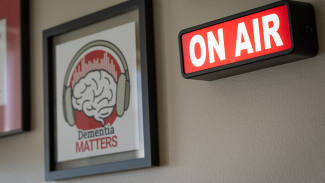
Dementia Matters host Nathaniel Chin, MD, helps translate research findings about brain health to a broad audience. Chin is a geriatrician, memory clinic doctor and medical director for the Wisconsin Alzheimer's Disease Research Center (ADRC) and the Wisconsin Registry for Alzheimer’s Prevention (WRAP) study. In all those roles, communicating science is a key priority, he said. By hosting the podcast, he’s learned a lot about the types of questions people have about science and how scientists can communicate their research outside academia.
In general, people want quality information and are especially interested in practical knowledge about activities like diet, exercise or sleep. And people living with a diagnosis of Alzheimer’s disease or related dementia, caregivers or people with a family history of the disease are understandably very interested in accurate updates about research and lifestyle strategies for better brain health, he said.
In the past, researchers may have been reluctant to share study data, worried it may be misunderstood or exaggerated, or they didn’t have a way to easily communicate their findings, he said. The podcast is a tool to communicate directly with a wide audience.
“When I’m doing an interview, I’m imagining myself as a listener, and I’m hoping the conversation reaches the people I see in clinic,” he said. “Science hasn’t always done a good job of giving frequent information that’s easy to understand, and I see the podcast filling that gap.”
When avenues for science communication don’t exist, it creates a gap and opens the way to misinformation, he said. “It’s crucial for people to have tools to understand and trust science, because the next time something like the Covid pandemic happens, I want them to have that foundation of how to recognize good information.”
By nature, scientists prefer to work in absolutes. They can be hesitant to widely share their work because they want to offer caveats or explore missing details. That need for absolute consistency is crucial, but it can override the desire to provide information, Chin said.
“Accuracy is obviously critical for science,” he said. “But what we know now is that a desire to not communicate information unless it’s perfect leaves room for others - who don’t have that standard - to give false or misleading information.”
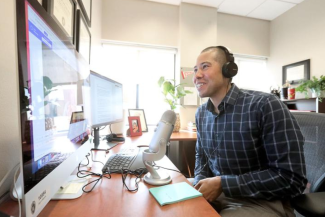
Chin can especially relate to a desire for information about brain health because he has a personal relationship with dementia caregiving. After graduating from UW–Madison undergraduate and medical school, Chin was completing a medical residency at the University of California San Diego when his father was diagnosed with early-onset Alzheimer’s disease.
Experiencing the realities of his father’s diagnosis and assisting as a family caregiver inspired him to switch career focus to geriatrics and eventually move back to his home state. He helped launch the podcast in his first year working at UW-Madison and has hosted every episode of the podcast, switching to at-home recordings in March 2020. In the early months of the COVID-19 pandemic, the podcast team produced a special series about caregiving during a pandemic, an example of an otherwise under-reported topic Chin said he was especially grateful to be able to discuss.
This summer, Dementia Matters reached a new milestone when it was selected to create a special series of episodes about the 2022 Alzheimer's Association International Conference (AAIC). The podcast served as the AAIC conference’s first podcast liaison and produced 8 episodes highlighting research from the event. This fall, the podcast is also working with the National Alzheimer’s Coordinating Center (NACC) and producing episodes with speakers from their fall and spring national conferences.
Dementia Matters has interviewed multiple well-known researchers and luminaries in the field of brain health, including nutrition researcher Martha Clare Morris, who pioneered the MIND Diet, and caregiving visionary Teepa Snow. The 100th episode of the podcast featured an interview with Nina Silverberg, PhD, director of the Alzheimer’s Disease Research Centers at the National Institute on Aging (NIA).
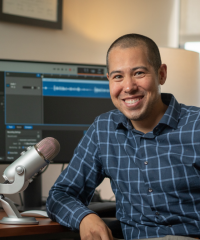
Future plans for the podcast include an expanded focus on the voices of research participants. Chin said he hopes to devote one episode a month to an interview with a person enrolled in a research study, which he feels is especially important.
“Research participants are the people who make this science happen,” he said. “These guests have a voice that’s not always heard, and it’s so important for our investigators and myself to keep their perspectives foremost in our work.”
Future episodes will also continue to focus on topics related to the significant health disparities in Alzheimer’s disease, including updates on research about why Alzheimer’s disease and related dementias disproportionately impact African Americans, Latinos and American Indians. Chin hopes to have episodes available in the Spanish language, as the Dementia Matters team works with Wisconsin Alzheimer’s Institute (WAI) scientist Maria Mora Pinzon, MD, MS, to translate episodes into Spanish.
A pioneer in campus podcasts
Creating a process to translate neuroscience to a general audience took some organization to get started.
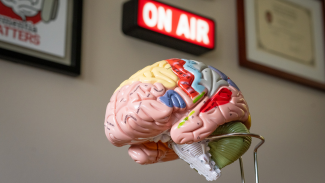
In her role as senior communications manager at Wisconsin ADRC, Rebecca Wasieleski produced the podcast and developed its format and program schedule. Wasieleski, now associate director of communications for the department of pediatrics, said she purposely designed episodes to last about twenty minutes, timed to fit a typical campus commute. The podcast is created by a team of individuals at Wisconsin ADRC, with help from communications specialist and producer Amy Lambright Murphy, student workers, and with support from the Wisconsin ADRC director Sanjay Asthana, MD, who championed Dementia Matters early on despite previously never having listened to a podcast. In the early years of the podcast, Wasieleski recalls student employees helping listeners find iTunes or other podcast platforms. Early podcast promotions included careful explanation of how to tune in, something that’s not as necessary now as more people are familiar with the media, she said. Several students have worked on the podcast during its tenure as producers and audio engineers. Recent UW–Madison graduate Caoilfhinn Rauwerdink started working for the podcast as a student and is now the multimedia technician for the podcast.
Perhaps one way to judge the program's reach is by the response it gets from listeners. Recently, the podcast team received an email from a listener who questioned some nutrition data presented on the show. The podcast’s information on diet is inconsistent, the listener said - pointing to one guest who advised a Mediterranean diet, another guest who described research linked to meat and dairy; and other guests who described the benefits of plant-based nutrition. So what exactly am I supposed to eat, the email writer asked.
“To get a question like that, it’s so flattering because it shows people are listening closely,” Chin said. “And, of course, to that listener, we respond and say, ‘You're right, science is not always clean. Sometimes it’s inconsistent.’ What we can do is inform people about the latest in what we know, and ask that they keep listening as we explore this journey together.”
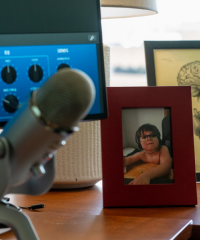
Listen to Dementia Matters on the Wisconsin ADRC website or subscribe to Dementia Matters through ApplePodcasts, Spotify or Podbean. Dementia Matters also airs on Fridays at 4 p.m. (CT) and again at 10 p.m. (CT) during the "Science Friday" segment on WMUU Radio, 102.9 FM in Madison, and is available to stream online on the station’s website.
Top 5 Dementia Matters episodes of all time
- Article by Claire Bitner



